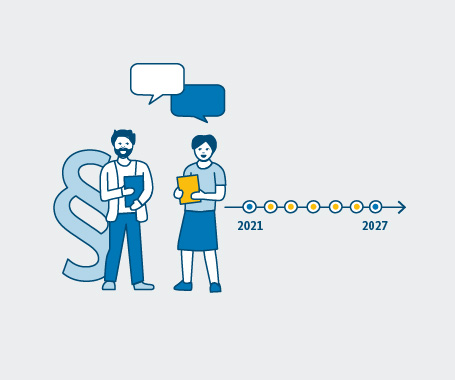The EU Fund's policy objective is to contribute to the efficient management of migration flows and to the implementation, consolidation and development of the common asylum system and the common immigration policy (AMIF Objectives).
The implementation and execution of the objectives must comply with the European Union's Charter of Fundamental Rights as well as national, European and international environmental and climate protection objectives, the principles of gender equality and non-discrimination.
In Germany, the Federal Office for Migration and Refugees manages the AMIF 2021-2027 funds on behalf of the Federal Ministry of the Interior and Community (Bundesministerium des Innern und für Heimat, BMI).
Classification of the AMIF
The Asylum, Migration and Integration Fund (AMIF), the Internal Security Fund (ISF) and the Border Management and Visa Instrument (BMVI) together form the so-called 'Internal Funds'.
The AMIF was used for the first time in the funding period 2014 to 2020. Previously, migration policy projects were funded with EU funds from the Solidarity and Management of Migration Flows (SOLID) programme, which consisted of the three individual funds European Refugee Fund (ERF), European Fund for the Integration of third-country nationals (EIF) and European Return Fund (RF).
Funding from the EU Fund can be applied for in the funding period 2021-2027 for projects under the four Specific Objectives or their implementing measures. The four Specific Objectives are defined by the Regulation (EU) 2021/1147 (AMIF Regulation) and have been specified in the (National) German AMIF Programme 2021-2027.
1) Strengthening and developing the common European asylum system
Measures in this area serve to improve the reception conditions for persons seeking international protection and to systematically identify asylum seekers with special needs at an early stage. In addition, asylum procedures should be made more efficient and identity verification procedures further developed.
2) Strengthening and further developing legal migration to EU Member States in accordance with economic and social needs and supporting the effective integration and social inclusion of third-country nationals
In the scope of Specific Objective 2, legal migration is to be promoted, also in cooperation with third countries, by providing safe and legal access routes to the EU. Another priority is the optimization and standardization of pre-integration measures for (highly) qualified professionals. Moreover, the aim is to quickly offer third-country nationals orientation in integration and to create equal opportunities, also through exchange with the host society.
3) Contributing to efforts countering illegal migration and enhancing safe and dignified return and readmission as well as supporting the first steps towards effective reintegration in third countries
Actions under Specific Objective 3 seek to integrate and coordinate return management at both EU and Member State level. In this context, incentives for irregular migration are to be reduced and voluntary return is to be promoted. A special focus is placed on the search for family members and on the consideration of the best interests of the child during reintegration. Enhanced cooperation with third countries is to promote their readmission capacity and sustained return.
4) Enhancing solidarity and the equitable sharing of responsibilities among Member States, in particular regarding those Member States most affected by migration and asylum challenges, including through practical cooperation
The aim here is to increase solidarity and cooperation with third countries affected by migration flows. Support is to be provided, inter alia, through resettlement in the EU. Furthermore, persons who have applied for international protection or who have been granted international protection will be assisted in transferring from one Member State to another.
Please note: More detailed information on the eligible measures can be found in the Call for Proposals.
General Information on the Programme
Who is the target group for AMIF 2021-2027 funding?
Eligible applicants are legal entities under private law and partnerships, legal entities under public law, international organizations and cooperation partnerships. The legal entities may have their registered office in Germany or abroad.
Total Funding Volume
A total of about €10 billion is available for all EU Member States in the funding period 2021-2027. Germany will receive around €1.5 billion for project funding and €500 million for special measures under the Thematic Facility (resettlement and humanitarian admission, relocation of persons in need of protection from one EU Member State to another).
Distribution of Funds within the Specific Objectives
The distribution of funds between the Specific Objectives is as follows:
- Specific Objective 1 – Common European Asylum System: 20 percent
- Specific Objective 2 – Legal Migration / Integration: 50 percent
- Specific Objective 3 – Countering Irregular Migration / Return / Readmission: 25 percent
Specific Objective 4 – Solidarity: 5 percent

